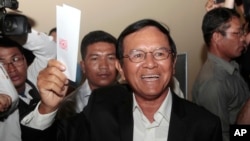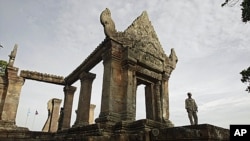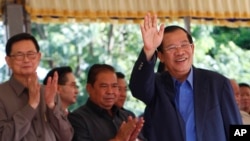The offense, as border incursions go, was relatively small: Around 30 Lao soldiers strayed over a poorly demarcated area of the Lao-Cambodian border where there is ongoing road construction.
But the response was swift, large-scale, and highly public. First, Prime Minister Hun Sen threatened imminent war if Laos did not withdraw its soldiers within six days. Then he flew straight to Vientiane and relayed the threat directly to Laos’ prime minister, Thongloun Sisoulith. The night before he left Phnom Penh, military trucks and tanks rolled conspicuously through the streets of the capital near Independence Monument, an unusual sight on a Saturday night in the crowded city center.
Shortly after Hun Sen arrived in the Lao capital, the two leaders announced they had reached an agreement, with Hun Sen calling it a “huge victory.” The ruling Cambodian People’s Party then issued a circular, later leaked online, instructing government officials across the country to publicly praise Hun Sen’s dispute resolution skills.
The document also called on “directors of provincial and municipal party committees to persuade government officials, armed forces, teachers, monks, businesspeople, farmers, students and civil society organizations” to submit petitions supporting the prime minister’s diplomacy.
Most recently, a full military brigade of more than 3,000 soldiers has formally established two weeks ago and will be permanently stationed along the Cambodia-Laos border in Stung Treng province.
Its ostensible role is to “defend the nation and its people and maintain good relations with the neighboring country.”
But during a ceremony on October 28 to inaugurate the new Intervention Brigade 128, Defense Minister Tea Banh hinted at a dual purpose to the militarization, calling on the new soldiers to preemptively quash political protests.
“Everywhere there is any movement to demand Kem Sokha’s release, take action immediately without asking advice from the top,” said Banh.
Photographs of the event posted on state media showed a large number of mortars, recoilless rifles, light machine guns and artillery arrayed in front of the new brigade, which comprises both redeployed soldiers and new recruits to the Royal Cambodian Armed Forces (RCAF).
Shortly after Hun Sen proclaimed victory in the border kerfuffle, he turned his full attention to domestic politics and launched one of his biggest political crackdowns in years, arresting opposition leader Kem Sokha, moving to dissolve the opposition Cambodia National Rescue Party, and targeting several independent media outlets and NGOs for closure.
So Chantha, a Cambodian political analyst, said border issues could be potent political symbols for leaders like Hun Sen, who frequently bolsters his claim to legitimacy by citing his ability to maintain peace and stability.
“The solution to the border conflict with Laos can be a message showing that Hun Sen is still influential and a strongman who can solve all types of issues,” he said.
He added that there had been heightened attention to border disputes in the lead-up to other national elections, most notably in 2008 when Hun Sen was praised for his forceful response to Thai attempts to claim land surrounding the Khmer temple of Preah Vihear.
Hun Sen himself cited this precedent during the Lao dispute, saying both incidents were examples of his special skill in keeping peace with Cambodia’s neighbors.
Caroline Hughes, a professor at the University of Bradford in the UK, wrote in a 2013 paper on Cambodian politics that the Preah Vihear dispute had a “significant effect” on the CPP’s easy victory in that year’s national election.
“We can speculate… that in the context of this international crisis, discontent with CPP corruption and development politics was subsumed,” she wrote.
“Voters are strongly aware that it is the CPP that controls the Cambodian armed forces and therefore perhaps regard the party as better placed than its opponents to respond to a foreign invasion.”
She argued that the border crisis, combined with lingering euphoria from the economic boom of the 2000s, made the 2008 election “virtually unlosable for the CPP.”
However, the premier and the CPP have proven sensitive to claims that his response to the border dispute was related to electioneering. In a speech in August, Hun Sen said he would arrest anyone who suggested as much.
“Why do you take an invasion from another country to insult the military and think it is an approach to gain votes?” he asked.
“Whoever says this must be responsible before the law,” he said.
Sourn Serey Ratha, the head of a minor opposition party, has been in jail since August after he joked on Facebook that ordinary soldiers in the field would suffer from deployment while military brass would reap the benefits from militarization, including the pleasures of wine and women.
He was arrested on August 14 and almost immediately sentenced to five years in prison for the offense.
Paul Chambers, a lecturer at the College of ASEAN Community Studies at Thailand's Naresuan University, said Hun Sen was playing to his strengths when he portrayed himself as a military leader and defender of territory.
Hun Sen was “strong and popular with Cambodia's military because he has shown a strong supportive role in the defense of Cambodia and the championing of the Royal Cambodian Armed Forces,” he wrote in an email.
This might also explain why he is particularly sensitive to perceived slights to the army, in which he is a five-star general. Over the past several months, Banh, the defense minister and a long-standing member of Hun Sen’s CPP, has also been unusually vocal in making public statements on politics, further reinforcing the strong ties between the military and the ruling party.
“I think that there is a direct correlation between tensions with Laos and the need for Hun Sen to build popular support as the 2018 election approaches. Besides, Laos is not a threatening country for Cambodia if Vientiane were to really become upset at Hun Sen,” Chambers said.
“The approach may whip up nationalistic sentiment among Cambodians and this could be helpful for Hun Sen in anticipation of the 2018 general election in Cambodia,” he added.
However, Sok Eysan, spokesman for the CPP, reiterated in a recent interview with VOA Khmer that there was no political element to the militarization whatsoever.
“We did this to protect our territory,” he said.
He added that Hun Sen was “always wise” with regard to border issues, and said the CPP circular ordering local officials to praise their superiors was unexceptional.
“For the CPP, what the boss says, the subordinates follow,” he said. “It means the CPP is a party with firm discipline and solidarity and internal unity.”







